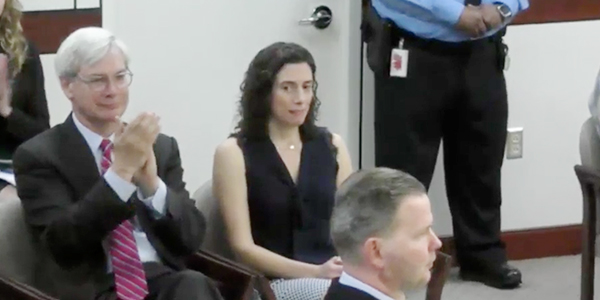FERC Chairman Neil Chatterjee on Thursday named veteran commission attorney Maria Farinella as chief of staff to replace Anthony Pugliese.

FERC attorney Maria Farinella receives applause after being announced as the commission’s chief of staff. | FERC
“Maria’s longstanding career as an energy attorney, both at FERC for the past decade and in private practice, makes her uniquely qualified to fulfill this key role,” Chatterjee said in a press release.
Farinella worked as a senior attorney in the Office of the General Counsel’s Energy Markets Division from 2009 to 2011, and as a senior legal adviser in the general counsel’s front office from 2011 to 2019. She was a legal adviser to Chairman Joseph T. Kelliher from 2007 to 2009. She is a graduate of Smith College and American University’s Washington College of Law.
Pugliese, who abruptly left the commission March 15, had served as chief of staff since August 2017, before the arrival of Kevin McIntyre as chair in December of that year. He stirred controversy last July for remarks he made at a conference of the American Nuclear Society and on the “Breitbart Radio Show,” in which he praised President Trump and criticized Democratic governors for blocking gas pipelines.
Chatterjee last month denied any conflict with Pugliese but declined to say why he had left. (See Chatterjee Tight-lipped on Pugliese Departure.)
Chatterjee: No Comment on NEPOOL Rules
At his regular press conference after Thursday’s monthly meeting, Chatterjee declined to comment on whether he agreed with Commissioner Richard Glick’s criticism of the New England Power Pool’s policy of excluding the public and press from stakeholder meetings.
On April 10, the commission voted 3-0 to dismiss RTO Insider’s complaint under Federal Power Act Section 206 asking it to force NEPOOL to open its meetings or to strip it of its role as the stakeholder body for ISO-NE.
Chatterjee joined Glick and Commissioner Bernard McNamee in concluding FERC lacked jurisdiction to force such a rule change (EL18-196). Glick filed a concurrence, saying that while he agreed with his colleagues on the jurisdictional issue, NEPOOL’s meeting policies are “misguided” and should be changed. (See FERC Rejects RTO Insider Bid to Open NEPOOL.)
New England is the only one of the seven U.S. regions served by RTOs or ISOs where the press and public are prohibited from attending stakeholder meetings.
Chatterjee declined Thursday to say whether he shared Glick’s view that NEPOOL’s meetings should be open. “I voted for the order. I think it speaks for itself,” he said, declining to elaborate.
LaFleur: Not Leaving Yet
Lame-duck Commissioner Cheryl LaFleur did not vote on the April 10 NEPOOL order or on an April 16 order regarding ISO-NE’s energy efficiency rules. (See FERC: ISO-NE Won’t Change EE Rules Without Stakeholder Talks.)

With the June 30 expiration of her term approaching, lame-duck Commissioner Cheryl LaFleur said she’s not leaving just yet. | © RTO Insider
The recusals led to speculation that LaFleur — who announced Jan. 31 that she would not be appointed to a third term — has begun to search for her next job. Although her term ends June 30, she could serve the remainder of this year if no replacement is confirmed.
ClearView Energy Partners said such recusals are “common when a sitting commissioner is interviewing with an entity that may be involved in proceedings before the commission.”
LaFleur, a New Englander, came to FERC after serving as executive vice president and acting CEO of National Grid USA.
LaFleur — who previously declined to give the reason for her recusal on the NEPOOL order — did not offer any clues to her plans at Thursday’s meeting, where she introduced her son and husband in the audience.
“For the members of our friendly press corps, the fact that I have my family here does not mean this is my last meeting,” she said, turning to reporters. “I will let you know when it’s my last meeting. I promise.”
PJM MOPR Issue ‘Really Complicated’
Chatterjee said the commission hasn’t yet acted on PJM’s proposed changes to its capacity market because of the complexity of the issues.
PJM, which normally holds its annual capacity auction in May, delayed it until August in the hopes that would give the commission time to rule on its proposed changes to its minimum offer price rule (MOPR). In June 2018, the commission ruled the RTO’s existing MOPR was unjust and unreasonable because it didn’t address price suppression from state subsidies for renewable and nuclear power. (See PJM to Hold Capacity Auction in August.)
Chatterjee was asked at his press conference whether FERC’s failure to act on the proposal suggested a 2-2 split among the current commissioners and the need to fill its fifth seat.
The chairman said although he was prohibited from discussing internal deliberations, he could comment “at the macro level.”
“When it comes to wholesale power markets, these aren’t things that break down on ideological or political lines,” he said. “It’s just something my colleagues and I and staff are working towards. It is not something that we’re gridlocked because of some kind of political difference. It’s really, really, really complicated.”
— Rich Heidorn Jr.




